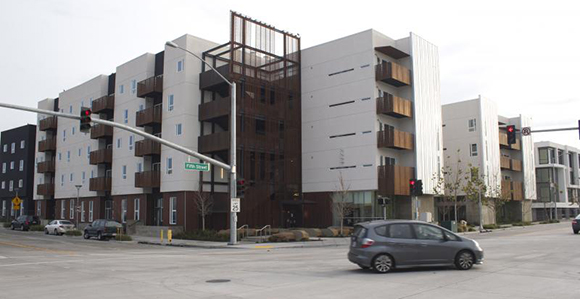
The Rivermark housing complex in West Sacramento (Photo Credit: downtownserg89/SkyscraperPage)
Many cities strive for a sense of community, a connection that can be brought about by having generations of families live in the same area. But the high cost of housing sometimes makes it hard for residents to afford to live in the communities in which they were raised. That’s why the city of West Sacramento has made providing affordable housing a priority.
“We’re trying to create a place where you may move within the community to different places as you age, or as things happen in your life,” said Mayor Christopher Cabaldon. “But there’s always somewhere in West Sacramento for you to thrive.”
West Sacramento has traditionally been one of the region’s poorest cities, added Cabaldon. In recent years, the city has become more economically diverse, but the need for affordable housing still exists. West Sacramento is in Yolo County, which is seeing a gap between housing costs and what low- or very-low-income earners can afford. Earlier this year, National Low Income Housing Coalition released its 2015 Out of Reach Report which showed that low-income residents in Yolo County would have to make an hourly wage of $21.25 to afford a two-bedroom rental at market rate.
West Sacramento is taking a proactive approach to provide affordable housing to its residents. Earlier this year, The Rivermark, an affordable housing complex with 70 units, opened along the Sacramento River waterfront. The city worked with Bridge Housing to develop the complex which is near public transit and one of the city’s main attractions, Raley Field.
“As we’re creating new neighborhoods, the new places, developing our waterfront, reclaiming it from its industrial past, we lead with our affordable housing projects and developments,” said Cabaldon. “They’re not an afterthought that gets built afterwards, but they’re part of the initial DNA that helps to shape these new places from the start.”
But the mayor admits that it isn’t easy to build affordable housing because of the added rules and regulations imposed by the state: “So right next to this affordable project are our market-rate units that are right next to the river. They’re kind of high-end units. The costs to build the affordable housing units are almost twice as much per square-foot to build the affordable units as opposed to the luxury units. That is not a sustainable strategy in terms of shifting the market toward a more universal affordability.”
He cited rules regarding how much retail and market-rate units can be included in the projects as well as proximity to gas stations and other regulations that make it expensive and difficult.
“I understand why affordable housing advocates want to have a very heavy rule-based system, in order to make sure that the worst performers have to do something,” said Cabaldon. “I’ve come to the perspective that those heavy rule-based systems also really dampen the intensity and effectiveness by which the performers want to go after the problem.”
But West Sacramento will push forward to build more affordable housing for its residents. One of the city’s new developments, West Gateway Place, was awarded $6.5 million in cap-and-trade grants and $2.6 million of those grants will go toward affordable housing. This will allow area residents live and work in the same area, thus avoiding long commutes to their jobs.
Making sure that cities and developers can build affordable housing units at a sustainable rate was part of the “One Million Challenges” set of goals prioritized at the California Economic Summit, co-presented by California Forward and the California Stewardship Network, held in Ontario last month. The plan of action sharpened during the Summit included exploring more ways to fund affordable housing projects such as dedicated sources of state funding, cap-and-trade revenue and tax increments financed through Enhanced Infrastructure Financing Districts
At the end of the day, Mayor Cabaldon said it’s about taking care of the West Sacramento community: “Things happen in our lives, whether it’s a layoff, or you end up having to go part-time, economic circumstances just happen. That’s a part of everyone’s life and we don’t want to be the kind of community where if you fall on tough times, you have to leave town.”

